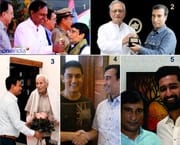Dr. Suresh Kumar Mishra ‘Uratript’
Dr. Suresh Kumar Mishra, known for his wit and wisdom, is a prolific writer, renowned satirist, children’s literature author, and poet. He has undertaken the monumental task of writing, editing, and coordinating a total of 55 books for the Telangana government at the primary school, college, and university levels. His editorial endeavors also include online editions of works by Acharya Ramchandra Shukla.
As a celebrated satirist, Dr. Suresh Kumar Mishra has carved a niche for himself, with over eight million viewers, readers, and listeners tuning in to his literary musings on the demise of a teacher on the Sahitya AajTak channel. His contributions have earned him prestigious accolades such as the Telangana Hindi Academy’s Shreshtha Navyuva Rachnakaar Samman in 2021, presented by the honorable Chief Minister of Telangana, Mr. Chandrashekhar Rao. He has also been honored with the Vyangya Yatra Ravindranath Tyagi Stairway Award and the Sahitya Srijan Samman, alongside recognition from Prime Minister Narendra Modi and various other esteemed institutions.
Dr. Suresh Kumar Mishra’s journey is not merely one of literary accomplishments but also a testament to his unwavering dedication, creativity, and profound impact on society. His story inspires us to strive for excellence, to use our talents for the betterment of others, and to leave an indelible mark on the world.
- Honoured with ‘Shrestha Navayuvva Rachnakar Samman’ by former Chief Minister of Telangana Government, Shri K. Chandrasekhar Rao.
- Honoured with Oscar, Grammy, Jnanpith, Sahitya Akademi, Dadasaheb Phalke, Padma Bhushan and many other awards by the most revered Gulzar sahab (Sampurn Singh Kalra), the lighthouse of the world of literature and cinema, during the Sahitya Suman Samman held in Mumbai.
- Meeting the famous litterateur Shri Vinod Kumar Shukla Ji, honoured with Jnanpith Award.
- Got the privilege of meeting Mr. Perfectionist of Bollywood, actor Aamir Khan.
- Meeting the powerful actor Vicky Kaushal on the occasion of being honoured by Vishva Katha Rangmanch.
Today we present his satire Click to Connect, Sigh to Reflect.
☆ Witful Warmth# 49 ☆
☆ Satire ☆ Click to Connect, Sigh to Reflect… ☆ Dr. Suresh Kumar Mishra ‘Uratript’ ☆
At the village crossroads, a bright and shiny hoarding screamed in full color: “A mobile in every hand, internet in every pocket.” Next to it stood Ramlal, a simple farmer who still thought of his mobile as a torch and a music box. He paused, confused, as if the banner had just whispered a prophecy. “Masterji,” he asked, scratching his head, “where does one catch this internet bug?” Masterji smiled, adjusting his glasses. “Everything’s online now, Ramlal—farms, fields, ration cards, weddings, even death certificates—it all fits in that tiny device.” Ramlal looked at his battered keypad phone and muttered, “This doesn’t even catch signal, how’ll it catch the internet?” The tea shop crowd burst into laughter, their chai nearly spilling. But that was the day Ramlal made a vow—his son would go digital.
With pride and poverty intermingled, he sent his son to the city to learn computers. A year later, the boy returned, laptop in hand, having finally stopped mistaking a mouse for a baby elephant. But the village had no power, no internet. One day, sitting among cows and crops, the son filled out an online form for a farmer’s subsidy. The site flashed: “Server Down. Please Try Again.” Ramlal squinted at the screen and asked, “Which crop is this ‘server’ that dies every season?” The poor boy clutched his head. And so, the word ‘digital’ slowly turned into a curse in the village’s vocabulary, like an evil spirit that haunted every WiFi-less hut.
Then came a day of miracles—or so it seemed. A government jeep rolled into the village, blaring from its deck: “Participate in the Digital Literacy Campaign!” People looked around as if some magic wand was about to wave. The secretary announced proudly, “Now land records will be stored in your mobile!” Ramlal, ever the realist, asked, “When there’s no water in the land, what use are mobile records? Should I plough my field with a screenshot?” The officer chimed, “You’ll now need to apply online.” An old man asked, genuinely curious, “Beta, first tell me where we get this ‘application sack’?” The crowd snickered, and the officer gently corrected him, “It’s not a sack. It’s a website.” The murmurs grew—”Seems like even plowing will soon happen on mobile.” Digital India had entered the village, but the village hadn’t entered Digital India. Not yet.
Then came the day when Ramlal received a message: “Rs. 6000 subsidy deposited in your account.” Overjoyed, he rushed to the bank. The banker calmly replied, “Your account isn’t linked to Aadhaar.” Ramlal blinked. “Is Aadhaar some special cow? One that gives no milk at the bank?” He was sent to get his Aadhaar made, but the machine at the center complained of the same old issue—network problems. After three days of sweating in queues, he still had no Aadhaar. The bank manager sighed, “The government is sending money, but you can’t catch it.” Ramlal responded with grit, “I’m a farmer, brother. I don’t catch money. I catch mud.” The village buzzed: the government wants us to fly, but forgot to give us wings. The hoardings flashed progress, but all the farmers saw were buffering wheels and power cuts.
Frustrated but not broken, Ramlal looked to the city for answers. He told his son, “Let’s leave the village. In the city, there must be power, internet—and maybe people too.” But the city was no land of salvation. Everyone seemed to be living inside their screens. Each human being was now a “mobile-staring worker,” lost in scrolls and swipes. The son whispered, “Father, hearts don’t beat here. Phones vibrate.” Ramlal sighed, “This city is like a body without a soul. At least in the village, eyes met and smiles had meaning.” But nostalgia has poor signal strength in a world obsessed with 5G. The village’s poverty seemed rich in comparison to the emotional bankruptcy of urban life.
One day, Ramlal fell ill. Off they went to a city hospital. The doctor peered over his specs and said, “Book an appointment online.” Ramlal coughed, “My body is sick, not my mobile!” The doctor chuckled, “Welcome to New India.” After struggling to get an appointment, a compounder whispered, “If you’ve got connections, treatment’s possible.” Ramlal asked, “Which connection? Electric? Water? Or political?” The doctor replied coolly, “Whichever one works.” The medicine was online, but the pain was very much offline. Treatment depended not on health but on hyperlinks. Ramlal realized that in Digital India, illness too had turned into a system crash.
As Ramlal’s condition worsened, his son, helpless, proposed, “Let’s go back to the village. Maybe peace still lives there.” But the village had transformed. Gone were the elderly gossiping at the chowk; everyone now sat hunched over screens. Ramlal’s eyes scanned for familiar faces, but all had become thumbnails. He whispered, “Son, return me the world where people called each other by name, not by usernames.” But the village had become an app, and relationships had logged out. Tradition had been replaced by touchscreens. Even the banyan tree, once a gathering place, now stood alone—its only company, a Jio tower humming above.
On his deathbed, Ramlal took one last breath and said, “Son, forgive me. I asked you to become digital but forgot to tell you to remain human.” The son wept, but not without multitasking—his fingers busy uploading a story: “RIP Dad.” Likes poured in. Comments too. But when it came to carrying the bier, no one showed up. In Digital India, Ramlal had finally become what most of us do—just another scrollable post, glanced at, liked, but never truly felt. His legacy? A few emojis, a blue tick, and an online condolence that never touched flesh. A life logged out, without ever really being logged in.
****
© Dr. Suresh Kumar Mishra ‘Uratript’
Contact : Mo. +91 73 8657 8657, Email : drskm786@gmail.com
≈ Blog Editor – Shri Hemant Bawankar/Editor (English) – Captain Pravin Raghuvanshi, NM ≈





